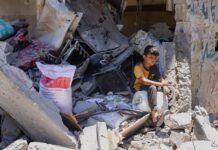The Guardian / October 6, 2024
Explosions heard across Lebanese capital; dozens reported killed with more wounded in hit on central Gaza mosque that Israel says was Hamas base.
Heavy consecutive strikes hit Beirut’s southern suburbs from late Saturday into Sunday, witnesses said, while Gaza’s civil defence agency said 24 people were killed and dozens wounded in an Israeli airstrike on a mosque in central Gaza early on Sunday.
The strike on the mosque, near the Al-Aqsa Hospital in Deir al-Balah, came as the war between Israel and Hamas in the Palestinian territory approaches its first anniversary on 7 October. Witnesses said the number of casualties could rise as the mosque was being used to house displaced people, while the Israeli military said it was being used as a Hamas command centre.
In the Lebanese capital, the Israeli strikes sent booms across the city and sparked flashes of red and white for nearly 30 minutes visible from several kilometres away.
The strikes came after days of Israeli bombing of Beirut suburbs considered strongholds for the Iran-backed armed group Hezbollah, killing its leader, Sayyed Hassan Nasrallah, and possibly his potential successor. A Lebanese security source said on Saturday that Hashem Safieddine, the potential successor, had been out of contact since Friday, after an Israeli airstrike near the city’s international airport that was reported to have targeted him.
Lebanese security sources said Israeli strikes since Friday on Dahiyeh, a residential area and Hezbollah stronghold south of central Beirut, were keeping rescue workers from scouring the site of Thursday night’s attack.
Safieddine’s loss would be another blow to the Hezbollah and its patron Iran. Israeli strikes across the region in the past year, sharply accelerated in the past few weeks, have shattered Hezbollah’s leadership.
Israel has been expanding its actions in Lebanon. On Saturday, it made its first strike in the northern city of Tripoli, a Lebanese security official said, and Israeli troops launched raids in the south.
At least eight strikes rocked Beirut’s southern suburbs late on Saturday including close to the airport, according to Reuters witnesses, after the Israeli military warned some residents to flee. Before the recent upsurge, exchanges of fire between Israel and Hezbollah had been mostly limited to the Israel-Lebanon border area, in parallel to Israel’s year-old war in Gaza against Palestinian group Hamas.
Israeli military spokesperson R Adm Daniel Hagari said on Saturday that Israel had killed 440 Hezbollah fighters in its ground operations in southern Lebanon and destroyed 2,000 Hezbollah targets. Hezbollah has not released death tolls.
Israel says it stepped up its assault on Hezbollah to enable the safe return of tens of thousands of citizens to homes in northern Israel, bombarded by the Lebanon-based group since last 8 October. Israeli authorities said on Saturday that nine Israeli soldiers had been killed in southern Lebanon since the operation began.
The Israeli assault has also killed hundreds of Lebanese civilians, Lebanese officials say, and forced 1.2 million people – almost a quarter of the population – from their homes.
A Lebanese security official told Reuters that Saturday’s strike on a Palestinian refugee camp in Tripoli killed a member of Hamas, his wife and two children. Media affiliated with the Palestinian group said the strike killed a leader of its armed wing, naming him as Saeed Atallah.
Israel said it killed two Hamas members operating in Lebanon, but did not say whether they had been in Tripoli. There was no immediate comment from Hamas.
In northern Israel, air raid sirens on Saturday sent people running for shelters amid rocket fire from Lebanon. Hezbollah said it had fired missiles at what it called “ATA company for military industries near Sakhnin base”, close to Haifa.
The Israeli army said two projectiles had crossed from Lebanon, one of which was intercepted while the other landed but caused no damage.
The violence came as thousands of protesters took to the streets in major cities around the world on Saturday demanding an end to bloodshed in Gaza and the wider Middle East as the start of Israel’s war in the Palestinian territory approaches its first anniversary.
About 40,000 pro-Palestinian demonstrators marched through central London while thousands gathered in Paris, Rome, Manila, Cape Town, New York City, Sydney and Melbourne. Demonstrations were also held near the White House in Washington, protesting against US support for its ally Israel in military campaigns in Gaza and Lebanon.
The top US general for the region, Gen Michael “Eric” Kurilla, was travelling in the Middle East, a US defence official said on Saturday, declining to specify which country or to confirm Israeli media reports that he had arrived there for consultations with Israeli military officials.
With Reuters and Agence France-Presse
_________
Israel expands Lebanon bombing campaign, plans further attacks on Iran and Gaza
CD Staff
Common Dreams / October 5, 2024
In the last 24 hours, Israel conducted at least 18 strikes in the Beirut area and reportedly targeted a paramedic team.
Israeli forces continued attacks on the outskirts of Beirut and in southern Lebanon on Saturday.
There were 13 Israeli strikes on the southern suburbs of Beirut overnight and another five on Saturday, one of which may have been targeted at paramedics, according to Al-Jazeera. The number of casualties is not yet clear.
“There is increasing destruction and it’s clear that complete blocks are being destroyed one after another,” Al-Jazeera’s Ali Hashem reported from Beirut.
“One strike hit near the airport, and we understand another missile hit near a paramedic team to prevent them from getting to the scene of the bigger strike,” he reported.
The Israeli military issued evacuation warnings for certain suburban areas south of Beirut on Friday night, indicating attacks would follow, The New York Times reported.
Israeli forces unleashed a “huge strike” on the same area earlier Friday in an attempt to kill Hashem Safieddine, the presumed successor to recently assassinated Hezbollah leader Hassan Nasrallah, according to The Times. Al-Jazeera reported that “bunker buster” bombs were believed to be used in the Friday attack, as they were in Nasrallah’s killing. It’s not clear if Safieddine was killed, though media reports indicate that he likely was.
Israel’s military also continued attacks in southern Lebanon on Saturday.
“From northern Israel, I can see dark grey clouds of dust and smoke rising above two [Lebanese] villages as warplanes zoom overhead and the sound of artillery echoes through the area,” The Times‘ Natan Odenheimer reported Saturday.
An Israeli strike in northern Lebanon killed Hamas commander Saeed Ali on Saturday, the armed Palestinian group said. Hamas has a longstanding presence in Lebanon.
According to Al-Jazeera, which cited Israeli media reports, the Israeli military is planning to expand its ground incursion into southern Lebanon, which began earlier this week, and to conduct “large-scale assaults” on Lebanon, Iran, and Gaza. The media outlet didn’t provide details.
Iran fired nearly 200 ballistic missiles at Israel on Tuesday, principally targeting military facilities. Iran said the strikes were retaliation for Israeli assassinations of Hezbollah and Hamas leaders. Most of the strikes were intercepted by Israeli and U.S. forces.
Observers are now watching closely to see how Israel responds, and what role the U.S. — Israel’s chief diplomatic ally and military supplier — might play. President Joe Biden said Friday that he’d advise Israel to consider “alternatives” to striking Iranian oilfields.












